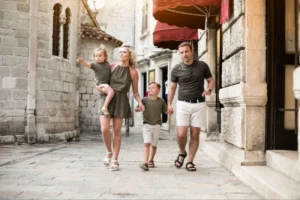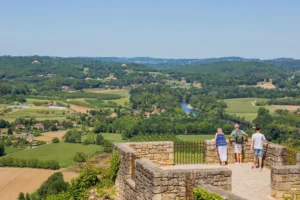Planning a trip to France often starts with daydreams of lavender fields, riverbank cafés, and cobblestone villages. But one decision quietly shapes your entire experience: where to stay in France? With thousands of hotels, B&Bs, châteaux, and countryside retreats, it’s easy to default to what’s convenient or familiar. Yet the right accommodation doesn’t just offer a place to sleep—it deepens your connection to the region, its culture, and its rhythm of life.
Your accommodation sets the tone for how you experience the region—its people, its pace, and its personality. Whether you want to wake up in a vineyard in Provence, a turreted castle in the Loire, or a sleek apartment in Paris, this guide helps you discover where to stay in France for a trip that’s unforgettable and uniquely yours.
This guide cuts through the noise. We’ll explore the full range of accommodations across France—from heritage-rich estates and vineyard retreats to urban hideaways—so you can match your stay to the kind of experience you want.
Living the Château Dream: Heritage, Nature, and Quiet Luxury
When considering where to stay in France, countryside châteaux offer more than just charm—they offer an entirely different rhythm of life. These stays provide space, stillness, and soul. Unlike standardized hotels, French châteaux immerse you in centuries of history, cradle you in nature, and give you something increasingly rare: quiet. For a primer on how these stays work—and who they suit—see Château Holidays: What to Expect.
For travelers seeking more than amenities—for those wanting emotion, atmosphere, and meaning—this is where to stay in France if you want to feel something, not just see something.
Château de Lasfonds – Private Elegance with Modern Comforts
Located in the wooded countryside of Nouvelle-Aquitaine, Château de Lasfonds offers an experience that feels both historic and quietly contemporary. This 17th-century estate is designed for travelers seeking peace, privacy, and a deep connection to place, without sacrificing modern convenience.
While the château evokes a traditional French castle stay, its fully upgraded interiors, well-equipped outbuildings, and flexible spaces make it just as functional for creative retreats, small events, or long, slow travel.
The estate is best suited to couples, families, or small groups looking for immersive stays—those who value atmosphere and autonomy over formal service.
Why it’s worth considering when deciding where to stay in France:
- Flexible year-round comfort with reversible air conditioning in all château bedrooms, full underfloor heating, and functioning fireplaces for winter stays.
- The heated outdoor pool is available seasonally or upon request, and it is ideal for guests from May through early autumn.
- Outbuildings with expanded amenities, including a large kitchen, gym, games room, BBQ and outdoor dining area, and a sauna in development (2024–2025).
- Private office and meeting facilities, with a printer, scanner, flipcharts, and adaptable indoor/outdoor event spaces.
- Self-catering setup across the château and outbuildings, with full kitchens and indoor/outdoor dining areas for flexible meal planning.
- Strict house rules preserve the integrity of the space—no indoor smoking, no pets inside (with accommodations possible for outbuildings), and thoughtful care of décor, floors, and shared items encouraged.
- Transport access includes the TGV to Angoulême (30–35 mins by car) or flights to Bordeaux, Limoges, or Bergerac. Car rental is recommended for local mobility.
If your idea of the perfect place to stay includes architectural heritage, natural serenity, and autonomy, Château de Lasfonds is your answer to where to stay in France—especially for longer stays or deep creative work.
Château de Bagnols
Château de Bagnols, located in the Beaujolais region of eastern France, is a fortified castle dating back to the early 13th century. Over the past several decades, it has undergone continuous, high-standard restoration to make it suitable for overnight stays without altering its core structure.
Each room is architecturally distinct and maintains historical features, such as ribbed vaulted ceilings, stone fireplaces, and defensive arrow slits.
Bagnols is approximately 30 kilometers northwest of Lyon, making it accessible for travelers who want historical immersion without logistical complications.
On-site facilities include a fine-dining restaurant, a compact spa, and curated access to regional wine producers. Wi-Fi and amenities are available, but connectivity is limited in thicker-walled areas.
This property best suits travelers interested in architectural preservation, regional history, and location-based travel. It is not optimal for families with young children or those seeking flexible, informal accommodation.
Château de Gudanes
Château de Gudanes is for the romantics and the dreamers. Perched on the edge of the Pyrenean mountains in southern France, this 18th-century château is a work in progress—and that’s part of its charm.
Cracked frescoes, worn staircases, and faded tapestries coexist with working fireplaces and cozy corners. Staying here feels like stepping into a living time capsule. The château opens seasonally for creative retreats, short stays, and cultural experiences, including music, writing, and hands-on workshops.
Boutique Hotels in the Cities: Style, Story, and Local Immersion
If you’re wondering where to stay in France for an authentic city experience, boutique hotels offer something beyond convenience. These intimate properties combine intentional design, thoughtful service, and strong ties to local culture. They’re ideal for short stays, cultural immersion, or adding a sophisticated touch to a longer journey.
Paris
Image from freepik. Aerial view of Paris
When it comes to where to stay in France’s capital, Paris offers an exceptional selection of boutique hotels hidden behind classic façades, often blending history with comfort and quiet.
Le Pavillon de la Reine (Le Marais)
A 17th‑century townhouse behind Place des Vosges. Its private courtyard isolates guests from city noise. Individually decorated rooms include ample closet space and blackout drapes, ideal for 3+ night stays. Concierge service remains low-key, supporting independent exploration.
Hôtel du Petit Moulin (Le Marais)
This 17-room property, once a bakery, was redesigned by Christian Lacroix. Bold design meets structural practicality: rooms are soundproofed with easy metro access, appealing to short-term design-focused travelers.
Hôtel Jules & Jim (Le Marais)
A light-filled gallery-style boutique with an inner courtyard for socializing or quiet downtime. Common areas foster creative interaction, and staff accommodate independent city exploration rather than scheduled programming.
Le Grand Mazarin (4th arr.)
Maximalist mid-century interiors are paired with a small spa and gym. Suitable for design lovers who want full-service amenities, rates begin around €630 per night and include refined on-site dining.
Hotel Grand Powers (8th arr.)
This hotel is near the Champs-Élysées and offers business-grade rooms with workspaces, soundproofing, and a compact spa. It’s a strong choice for professional visitors who need logistical ease.
Lyon
View of Lyon city from Fourviere, France
If food and history are part of your decision on where to stay in France, Lyon’s boutique hotels deliver. These properties often repurpose historical structures into elegant modern stays.
Villa Florentine (Vieux Lyon)
Converted Renaissance convent offering panoramic city views, terrace dining, and a pool. It requires uphill walking or taxis, but rewards guests with views and proximity to Lyon’s food scene.
Maison de l’Abbaye (Ainay district)
A 4-star boutique with a bistro emphasizing local sourcing. Rooms are quiet and straightforward, ideal for travelers seeking dine-in convenience without urban noise.
Okko Lyon Pont Lafayette
This minimalist, work-focused hotel has co-working-ready amenities, strong Wi-Fi, and functional layouts. It is designed for professionals or creatives who want to balance work and travel.
MOB Hotel (Confluence)
An industrial-chic social hub with a rooftop garden and community events. Best for younger travelers seeking interaction and creative programming, not solitude or executive service.
Marseille
France, Marseille – Habor of Marseille
Marseille offers a more rugged, character-driven urban stay—perfect for those choosing where to stay in France beyond the mainstream.
Hotel C2 (Cours Pierre Puget)
Set in a 19th-century mansion, it combines contemporary interiors, reliable spa services, and strategically quiet rooms. It is suitable for business travelers needing consistency in a rugged city.
Les Bords de Mer
Direct beachfront access, balcony views, and modern spa facilities make this a compelling pick for city dwellers heading to the coast. It balances seaside comfort with urban access.
Maison Montgrand
Two conjoined townhouses offer minimalist rooms, an internal garden, and a tea salon. They provide an intimate scale and quiet ambiance in a stable city location.
Nice
Nice’s boutique scene leans into coastal relaxation and cultural roots, avoiding generic luxury for character-driven design.
- Hôtel du Couvent: A converted convent with Roman-style bath spa and cloistered architecture. Offers a calm space by the beach without sacrificing convenience—the Promenade is a few steps away.
- Hôtel Amour Nice: Casual, youthful, and art-filled. Ideal for couples or creatives seeking design-forward rooms and a laid-back vibe near Old Town.
- Hôtel Rossetti (Old Town): Smaller gem with stone walls and wooden beam interiors. Centrally located within cathedral steps and food markets, it delivers immersive local living with modern standards.
Bordeaux
Bordeaux’s boutique hotels reflect the city’s wine heritage, urban elegance, and walkability.
- La Course – Bibendum & Derive: An industrial factory conversion combining bold interiors with access to riverside dining and wine bars. It appeals to travelers wanting design and wine immersion.
- Mama Shelter Bordeaux: Philippe Starck’s playful interiors paired with a brasserie and social bar scene. A strong pick for those wanting nightlife and centrality.
- Yndo Hôtel: Housed in a private mansion, featuring curated rooms, a library, and a calm courtyard. Perfect for refined guests seeking distraction-free stays.
Toulouse
Street in Toulouse’s historical center, France
“La Ville Rose” boasts manageable size and historic charm, ideal for thoughtfully curated boutique accommodation.
Boutique Hotel SOCLO
A seventeen-room property is a short walk from Basilique Saint-Sernin. Cleanliness and service are consistently rated as exceptional. Rooms include smart TVs, a mini-bar, garden-view windows, and a summer outdoor pool. The bar and restaurant serve well-prepared meals in a relaxed garden setting.
Le Grand Balcon
An aviation-themed hotel near Capitole Plaza, set in a 1930s building. Offers modern amenities like blackout drapes, an in-room safe, and a stylish lounge bar. Central location and comfortable design are big draws.
Strasbourg
Strasbourg cityscape on a warm summer evening, France
With its cathedral district and European quarter, Strasbourg balances cultural tourism with local life.
Hôtel Tandem
An eco-conscious, railway-adjacent boutique with refillable water bottles replacing mini-bars and local breakfasts. Strong green standards and central walking access make it sustainable and convenient.
Hotel des XV
Located in a quiet residential area near the European Parliament, this hotel has 10 spacious rooms with sound insulation, which is practical for business and cultural travelers.
Montpellier
Montpellier’s youthful, creative energy is reflected in its eco-conscious, design-led boutique hotels.
- Hôtel Richer De Belleval: Stylish Relais & Château property with on-site restaurant, terrace, and a prime spot near the Cathedral of Saint Peter. Rated around 8.9/10 for service and location.
- La Parenthèse Roucher: Library-listed as “excellent,” this duplex in central Écusson features soundproof rooms, helpful owners, clean design, and proximity to trams and nightlife.
- Villa Magnolia: Boutique hotel praised for spacious rooms, large showers, pool access, and attentive staff. Rated 9.1/10—ideal for travelers wanting comfort and design.
Lille
Just over an hour from London by Eurostar, Lille’s boutique hotels offer a vibrant alternative to Paris.
- Hotel L’Arbre Voyageur: Housed in a former Polish consulate, steps from Lille Europe station. Provides contemporary rooms and two restaurants (gourmet Jane and Ma Reine brasserie).
- Mama Shelter Lille: Inspired by Rotterdam’s branch, it offers playful, urban style from ~£78/night. Centrally located with a rooftop bar, ideal for younger or budget-conscious travelers.
- Hôtel Castiaux: This Art Nouveau hôtel particulier, built in 1886 and restored after abandonment, is recognized for detailed ironwork, wood carving, and an artist’s roof terrace—appealing to architecture fans.
Country Guesthouses & Rustic Escapes: Authenticity, Hosts, and Regional Identity
If you’re looking for where to stay in France beyond the well-trodden hotel path, country guesthouses—gîtes and chambres d’hôtes—offer immersive, locally grounded experiences. These rural stays emphasize personal hospitality, regional architecture, and meaningful host interactions.
What makes these options special isn’t just their rustic charm, but how they connect you to local life. If your idea of where to stay in France involves farmers’ markets, stone farmhouses, or vineyard views, this is where to begin.
Provence: Stone Farmhouses & Seasonal Rhythm
Provence village Menton after sunset, Menton, France
In Provence, successful guesthouses honor environmental integration and historical materials.
Mas de la Rose (Alpilles)
Set in a restored 17th-century farmhouse, Mas de la Rose features limestone walls and wooden beam interiors. Rooms are spacious enough for work-and-stay visits, each with courtyard access. Host-led meals emphasize seasonal produce and wine pairings. Ideal for travelers looking to combine downtime with access to local markets, winery visits, and natural hiking trails.
Le Clos Saint Saourde (Beaumes-de-Venise)
Carved into a rockface, this small property blends natural cliff walls with restored stone and glass bathrooms. The heated pool is spring-fed. It attracts couples and small groups seeking intimate stays with a landscape-embedded feel. Remoteness limits daily outings—this is a base for slow living, not active touring.
Alsace: Timbered Style & Wine Route Connection
Alsace guesthouses often balance architectural typology with winery access.
Maison d’Émile (near Route des Vins)
A traditional half-timbered home with modernized interiors. Hosts provide insider recommendations for lesser-known wineries. Breakfasts include regional cheese and bread. Small size ensures quiet, organic interaction with host families. Suited to travelers wanting structured visits to local wine cellars without big-tour pressure.
La Cour d’Alsace (Eguisheim)
Located in a popular wine village, this guesthouse uses Gothic architecture in its central courtyard layout. Rooms combine original beams with new bathrooms. Hosts assist with table booking in local winstubs. Ideal for couples wanting evenings in authentic Alsatian settings.
Brittany & Normandy: Coastal Heritage & Farmstead Hospitality
These regions offer stays rooted in agrarian tradition and coastal ecosystem periods.
Les Chambres de La Vallée (Brittany, near Emerald Coast)
A converted granite farmhouse offering thick-wall insulation and wood-burning stoves. Rooms overlook farmland and ancient hedgerow lanes. Hosts supply cider and salted butter at breakfast. This property suits travelers who prefer remote coastal trails and sea-air solitude.
Le Moulin de la Porte (Normandy, near Bayeux)
Situated on a working cider-pressing mill, this gîte features stone-arched bridge details and river views. Hosts offer private tours of their traditional press. While not hotel-grade, it suits culturally curious families wanting farm life immersion and easy access to Normandy’s WWII museums.
Dordogne & Satellite Regions: Farmhouse Gîtes with Flowing Ground Space
Here’s where scale and land interplay with autonomy.
Gîtes de Grange Neuve (Dordogne)
Group of independent cottage units built from restored barns. Each unit has its own patio, Wi-Fi, and kitchenette. Grounds include a shared vegetable garden and pool. Best for multi-generational families or groups seeking independence with shared facilities. Proximity to medieval Bastide towns supports balanced exploration.
La Ferme du Naudin (Loir-et-Cher)
A converted dairy farm set on 80 acres of woodland and pasture. Hosts offer guided horseback riding and breakfast featuring their milk and cheese. Appropriate for families or couples wanting moderately active rural stays.
Auvergne & Central France: Highland Retreats & Peasant Heritage
These inland guesthouses prioritize indoor warmth and mountain access.
Maison de la Pérrière (Auvergne Volcanoes park)
Built from lava stone, this guesthouse offers underfloor heating and large fireplaces. Rooms face hiking paths in a national park. Hosts organize group walks and wildlife viewing, and offer a picnic hamper service.
Le Pressoir de Marie (Berry region)
Nestled in a small village, this stay is in a former fruit press. The central courtyard hosts pesto-making classes using local produce. It is more of a cultural guesthouse than a hotel, suitable for travelers seeking workshops and a rural French village lifestyle.
Vineyard Retreats & Spa Hotels: Rural Indulgence with Regional Depth
France’s wine regions produce world-class vintages and host some of the country’s most immersive lodging experiences. Vineyard retreats and wine-spa hotels offer something distinct from châteaux and rustic farm stays: curated luxury rooted in terroir.
These properties are ideal for travelers who want comfort, but not detachment. You’ll still find tasting rooms, heritage estates, and spa facilities—but with direct exposure to the land and process behind the bottle.
The following accommodations are designed for guests who want to unwind without sacrificing connection to local culture.
Bordeaux Region: Wine Estates with Refined Infrastructure
Bordeaux offers France’s most developed wine tourism ecosystem, with vineyard hotels ranging from contemporary lodges to 19th-century estates. Unlike smaller wine regions, Bordeaux retreats often include high-end restaurants, structured tastings, and bilingual staff trained in oenotourism.
Les Sources de Caudalie (Martillac)
Located on Château Smith Haut Lafitte grounds, this five-star wine and spa hotel is a benchmark for combining viticulture with wellness. Rooms are built using reclaimed regional materials, and the spa offers treatments that use grape skins, polyphenols, and extracts from the vineyard itself.
Guests can tour the château, participate in tastings, or spend the day in the geothermal bath house. It is ideal for couples and wine-focused leisure travelers who want an all-in-one estate experience without leaving Bordeaux’s orbit.
Château Hôtel Grand Barrail (Saint-Émilion)
Positioned near the UNESCO-listed town of Saint-Émilion, this 19th-century château offers a traditional exterior with fully modernized interiors. The spa is smaller than Caudalie’s but includes a hammam and offers Caudalie-branded treatments.
The location allows easy access to dozens of classified growths and village restaurants, making it ideal for wine tourists who value flexibility and mobility over all-inclusive packages.
Champagne Region: Sparkling Wine, Hillside Spas, and Landscape-Driven Luxury
The Champagne region’s best properties emphasize its sloping vineyards, limestone caves, and high-end service culture. These retreats are best for travelers interested in premium experiences within a distance from Paris.
Royal Champagne Hotel & Spa (Champillon)
Overlooking the vineyards of Épernay and the Montagne de Reims, this hotel was once a coaching inn for kings. Now redesigned as a contemporary wellness estate, it features large glass-fronted rooms, a full spa with hydrotherapy pools, and access to small-production Champagne houses.
Unlike many luxury hotels, the property avoids stiff formality—staff are multilingual, and programs include yoga, biking routes through the vineyards, and sabrage (Champagne bottle-opening) lessons. It’s suited to travelers looking for top-tier comfort within a highly structured wellness setting.
Domaine Les Crayères (Reims)
An established Relais & Châteaux property, Les Crayères balances old-world elegance with vineyard immediacy. It features manicured French gardens, a classic restaurant holding two Michelin stars, and walking-distance access to major Champagne houses like Pommery and Veuve Clicquot.
Rooms are traditional, not minimalist, and service leans formal. Ideal for heritage-focused travelers and special-occasion stays.
Burgundy: Understated, Regional, and Food-Forward
Burgundy’s vineyard retreats often lack the scale of Bordeaux but compensate with intimacy and regional authenticity. These stays are well-suited for serious wine travelers, culinary enthusiasts, and those seeking access to small-production domaines.
La Maison d’Olivier Leflaive (Puligny-Montrachet)
This boutique hotel is owned by a winemaking family and is located directly above their cellar. Stays include in-house tastings, village walking tours, and optional vineyard lunches with paired flights.
The rooms are minimal but well-heated and well-lit, and the on-site restaurant specializes in local recipes. This is perfect for guests focused on white Burgundy and immersive local contact.
Hostellerie de Levernois (near Beaune)
A luxury countryside hotel with a focus on quiet, rural elegance. Rooms open onto wooded parkland, and the on-site restaurant—run by chef Philippe Augé—offers multi-course Burgundy menus. The wine list includes over 1,000 labels.
Electric bikes and concierge-led tastings are available. This property suits slow travelers with a wine-first agenda who want lodging, food, and activity coordination in one place.
Alsace: Wine Routes with Storybook Setting
Alsace’s wine country stretches along the foothills of the Vosges mountains. Vineyard accommodations here are smaller and more family-run, but often offer direct access to biodynamic or independent wineries.
Le Clos Saint Vincent (Ribeauvillé)
Situated at an elevation with views of the Rhine valley, this wine hotel offers thermal spa treatments, tasting menus, and proximity to the Route des Vins. The property’s altitude means cooler evenings and better ventilation in summer. It’s a strong option for travelers who want a restful base for wine excursions without heavy commercialization.
These vineyard and spa hotels are best for travelers who value experience over excess. While many offer comfort, the key difference lies in how well they connect guests to the region’s soil, people, and production methods. If chosen well, these stays become more than luxurious—they become extensions of the land itself.
How to Choose the Right Stay: Matching Your Destination, Purpose, and Travel Style
With so many types of accommodation in France—from private châteaux and city boutiques to rural gîtes and vineyard lodges—the challenge isn’t availability. It’s alignment. The quality of your stay often depends less on star ratings and more on whether the property suits the kind of trip you’re taking.
Here’s how to evaluate your options based on a few key factors.
Trip Purpose
Start by asking why you’re going. A leisure trip through wine country has different needs than a fast-paced urban visit or a multigenerational family holiday.
- If you’re visiting for cultural immersion, prioritize smaller guesthouses or heritage hotels where the hosts live on-site or the design reflects local tradition. These properties allow for informal conversation, regional guidance, and daily rhythms that feel rooted in place.
- For wellness or recovery-focused trips, vineyard hotels and spa lodges outside city limits are usually better suited than urban hotels labeled “luxury” but lacking quiet or green space.
- Travelers in France for a milestone—a honeymoon, anniversary, or solo retreat—may benefit from high-end châteaux or secluded estates with fewer guests and personalized services.
Region and Seasonality
Some properties only shine in the right season. Don’t just look at photos—check what’s available when you go.
- Rural guesthouses and gîtes in regions like Dordogne, Loire Valley, or Provence often operate seasonally. Pools, outdoor dining, and specific local experiences may only run between May and September. Off-season stays are quieter but may offer fewer amenities.
- In contrast, cities like Paris, Lyon, and Strasbourg have year-round boutique hotel options, and off-season stays often mean better rates with less competition.
- If you’re heading to mountain regions like the Alps or Auvergne, winter stays may emphasize indoor comfort and heating, while summer highlights hiking and open-air space.
Group Type
The needs of solo travelers, couples, and families diverge quickly, so should your accommodation strategy.
- Couples may benefit from adult-only properties, spa-focused hotels, or vineyard retreats with in-room amenities like terraces, soaking tubs, or fireplaces.
- Families need space to spread out, kitchen access, flexible mealtimes, and safe outdoor areas. Look for gîtes, countryside estates, or family-oriented guesthouses with enclosed gardens and on-site laundry.
- Solo travelers might prioritize walkable access, staff support, and quiet common spaces—especially in unfamiliar regions. Smaller city boutiques or creative retreat spaces in the countryside offer privacy and low-pressure social interaction.
Level of Independence
Ask how much structure you want. Some travelers want services—daily housekeeping, on-site dining, concierge help—while others prefer autonomy.
- Guesthouses and family-run gîtes offer flexibility for self-catering and schedule control, but may require you to plan your activities.
- Boutique hotels and châteaux typically offer more structured services—meals, reservations, and daily room cleaning—but less flexibility with check-in/check-out or dietary routines.
Choosing the right stay in France isn’t just about how a place looks online—it’s about how well it supports your goals for the trip. Prioritize properties that work with your daily rhythm, not against it.
Let the Stay Shape the Experience
Aerial view of Chateau de Lasfonds
Where you stay in France doesn’t just influence how you rest—it affects how you engage with everything around you. The right setting won’t interrupt your plans; it will support them. Whether you’re searching for quiet, connection, perspective, or inspiration, space matters. So does pace.
Some places exist outside typical categories. They’re meant for slow mornings, shared meals, deep work, or simply room to think. Château de Lasfonds is one of those places. For more properties that share this intimate, atmospheric spirit, see our selection of Small French Châteaux across France.
Book Now
Château de Lasfonds is available for short stays, creative retreats, small gatherings, and extended escapes. If the space feels aligned with what you need—quiet, time, room to think—you can explore availability and details directly on the official site.
FAQs about Where to Stay in France
For first-time visitors, boutique hotels in central city locations offer convenience, comfort, and local charm. They provide easy access to major attractions, public transport, and neighborhood dining, making it easier to explore France without worrying about long travel times or unfamiliar surroundings.
Not at all. While some châteaux offer high-end experiences, many countryside estates provide mid-range stays with historic charm, family-style meals, and scenic surroundings. They’re ideal for travelers seeking tranquility, culture, or romantic settings without necessarily splurging on luxury amenities.
Boutique hotels are typically smaller, independently run, and design-focused. They often reflect local culture and offer personalized service. Regular hotels, especially chains, provide standardized amenities and a more uniform experience across locations, often prioritizing consistency over character.
Some are, but many rural châteaux or farm stays require a car for access. Train routes may reach nearby towns, but a car gives you flexibility to explore vineyards, villages, and markets off the beaten path. Renting a car is often the best option.
Yes, many châteaux welcome families with large rooms, gardens, and activities like cycling or cooking classes. Some even offer kids’ menus and play areas. Always check individual property policies, as amenities vary widely depending on the region and size of the estate.
A “gîte” is a self-catering holiday rental, often rural and affordable, ranging from cottages to apartments. It differs from a château, which is typically a grand historic estate. Gîtes suit independent travelers, while châteaux offer more hosted or luxurious experiences.
Yes, rural France is generally very safe. Village communities are quiet and welcoming, and crime rates are low. Still, it’s wise to follow usual travel precautions—lock your doors, avoid leaving valuables in cars, and check recent reviews before booking.
Absolutely. Not all châteaux are expensive. Some offer rooms under €150 per night, especially in less touristy regions. Look for B&B-style châteaux or off-season deals for the best rates without sacrificing atmosphere or authenticity.
Top regions include Provence, Dordogne, Alsace, Burgundy, and the Loire Valley. These areas offer scenic landscapes, vineyards, local food, and historic towns. Each region has its distinct feel—Provence is sunny and rustic, while the Loire Valley is known for fairy-tale châteaux.
Yes, boutique hotels are great for solo travelers. They often have a warm, welcoming environment and staff who offer personalized recommendations. Many are located near cafes, cultural spots, or public transport—making it easy to explore solo while feeling safe and supported.
Many do, but it varies by property. Continental breakfast (croissants, jam, coffee) is standard and sometimes included in the room rate. Larger estates or boutique hotels may offer full breakfasts with local cheeses, eggs, and fruit. Always check the booking details.
Yes, eco-lodges, green-certified hotels, and sustainable châteaux are increasingly popular. Many use solar power, source local ingredients, and practice waste reduction. Look for labels like “Green Key” or “EcoLabel” when booking if sustainability is a priority.
Expect thoughtful design, curated local experiences, and personalized service. Boutique hotels may offer artisanal breakfasts, custom toiletries, or wine tastings. Unlike large hotels, they emphasize ambiance and uniqueness over standardized luxury features like pools or business centers.
Spring (April–June) and early fall (September–October) are ideal for travel because of pleasant weather, fewer crowds, and better availability. Booking 2–3 months ahead ensures you get the best selection, especially in high-demand regions like the Loire Valley or Provence.
Many châteaux accommodate private events, weddings, or creative retreats. They often provide exclusive-use options, catering, and on-site coordination. It’s best to contact the property directly for availability, pricing, and custom arrangements based on your group size and needs.




